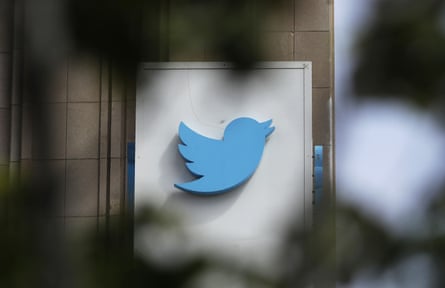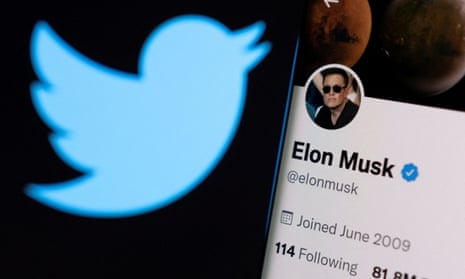It’s been a chaotic few days for Elon Musk.
After announcing he had quietly become Twitter’s largest shareholder, this week Musk launched a hostile takeover bid, offering to buy the social network for $43bn. Twitter’s board responded on Friday by announcing it would implement a plan that could stall or prevent Musk’s attempt.
But experts say the next developments are difficult to predict, said Alma Angotti, an SEC compliance expert at Guidehouse Consulting in Washington. Among many possible paths forward, Musk could retract the offer, dump his existing stock in Twitter, or continue with his quest to take over the company.
“Before they go through a lot of time, trouble, and expenses to respond to Musk, Twitter is likely trying to decide how serious he is,” she said. “If they simply say no to his offer, what is he going to do?”
So what next? Here are some of the biggest remaining questions about Musk’s surprise acquisition attempt.
How did we get here?
On 4 April, Musk revealed in a filing to the US Securities and Exchange Commission (SEC) he had bought up almost $3bn in Twitter shares, making him the platform’s largest shareholder with at 9.2% stake. (Shortly after, Vanguard group surpassed him, now owning 10.3% of the company.)
Musk then offered to purchase Twitter outright at a price of $54.20 a share – 38% higher than Twitter’s 1 April close, the last trading day before his stake in the company was made public – stating this was his “final offer”. While Twitter seems poised to reject the deal, Musk could still buy up additional shares of the company on the open market, or win over shareholder support in the case of a vote.
Jack Dorsey, Twitter founder and former CEO, noted in a tweet on Friday that such surprise purchases have always been a risk for the company. “As a public company, Twitter has always been ‘for sale’,” he said. “That’s the real issue.”
To prevent such a buyout, Twitter has implemented a relatively rare method called a “poison pill” plan. In this limited-duration shareholder rights arrangement, existing shareholders can buy stocks at a substantial discount in order to dilute the holdings of new investors and protect its ownership.
Will Twitter’s plan actually stop Musk’s purchase?
Under the “poison pill” plan, Musk would have to spend an increasing amount of money to maintain a majority stake in the company. In theory, the hostile investor’s cash would eventually run out, but this may be more complicated in practice when contending with the richest man in the world. Musk is worth around $260bn.
Twitter’s “poison pill” plan will only go into effect if Musk (or any other would-be purchaser) acquires more than a 15% stake in the company. Such plans have been triggered only a handful of times in history, said Alon Kapen, a corporate lawyer with expertise in SEC compliance at the New York firm Farrell Fritz.

“No rational buyer would knowingly exceed that threshold,” he said.
But Musk already has indicated he may be willing to exceed that threshold, denying Twitter’s offer for an executive seat on its board of directors – which came with the condition his ownership stake of Twitter would remain below 14.9%.
Why is Musk doing this, and is he serious?
Musk is known for his wacky antics, irreverent public statements, and unexpected business decisions – so you would be forgiven for questioning whether his threats to purchase Twitter are legitimate.
It would not be the first time Musk has been caught bluffing. He famously tweeted in 2018 he would take Tesla private and declared he had secured the funding to do so, which the SEC disputes. That move cost him $20m in a settlement with the SEC, which made him promise to screen tweets regarding Tesla in advance (a measure he has been accused of violating multiple times since then).
In the 2018 incident, Musk priced Tesla shares at $420 a share – a joking reference to marijuana. His offer to purchase Twitter this week was priced at a similarly cheeky $54.20 a share.
Such offers lead many to wonder whether this is all a joke to Musk, said Karen Kornbluh, a senior fellow and tech policy expert at the German Marshall Fund – or if it is strategic.
“He has this huge platform and he maintains it by doing unexpected and crazy-seeming things,” she said. “Often he seems to benefit from the chaos.”
Musk also has a storied personal history with Twitter: he faced a defamation lawsuit after using the platform to baselessly call a diver, who rescued a team of young soccer players stuck in a flooded cave in Thailand, a “pedo guy”.
The SEC investigated him for his 2018 tweets regarding taking Tesla private and is again investigating him on recent allegations of insider trading related to his tweets. While these experiences appear to have sparked a personal vendetta against Twitter, Musk’s issues are not necessarily universal.
“Superficially he seems to argue everyone should be able to say what they want on Twitter, which is an attractive argument to some,” Kornbluh said. “But this is a special case – it’s about following SEC regulations, not free speech.”
What would an Elon-run Twitter look like?
Civil rights experts have sounded the alarm over a Musk-controlled, “free speech”-focused Twitter.
A self-proclaimed “free speech absolutist”, the billionaire has called for a rollback of the platform’s content moderation policies and practices, a prospect that the non-profit group Muslim Advocates called “extra troubling”.
“Online hate speech is a serious threat to the nation’s marginalized communities and frequently translates into offline attacks,” said Sumayyah Waheed, senior policy counsel at Muslim Advocates.
In terms of Twitter’s structure, Musk has been clear he would take Twitter private, but tweeted that he “will endeavor to keep as many shareholders in privatized Twitter as allowed by law”.
More broadly, some civil rights advocates say the Musk episode shows how tech companies, and those who control them, have far too much power over millions of users.

“Users of social-media platforms shouldn’t have to be subject to the whims of bombastic billionaires who are detached from reality and lack any true commitment to free expression, racial justice and democracy,” said Jessica J González, the co-chief executive of the non-profit social justice organization Free Press.
What does this mean for the ongoing US investigations into Musk?
Musk’s attempts to buy Twitter come as he is already under the microscope over dealings with the SEC.
In February, Musk accused the agency of harassing him and his company with “endless” investigations in retaliation for his vocal opinions of regulators.
“The SEC seems to be targeting Mr Musk and Tesla for unrelenting investigation largely because Mr Musk remains an outspoken critic of the government,” Alex Spiro, a lawyer for Musk wrote in a letter last month.
Angotti said Musk’s Twitter hijinks could cause him additional SEC headaches. He failed to disclose his stake in Twitter in the required timeframe, meaning he is almost sure to face a fine. Furthermore, the SEC will probably investigate whether he indeed had the funds to outright purchase Twitter when he offered to do so this week.
“There is going to be a lot of dissection of what he said when and whether he meant it,” she said.
